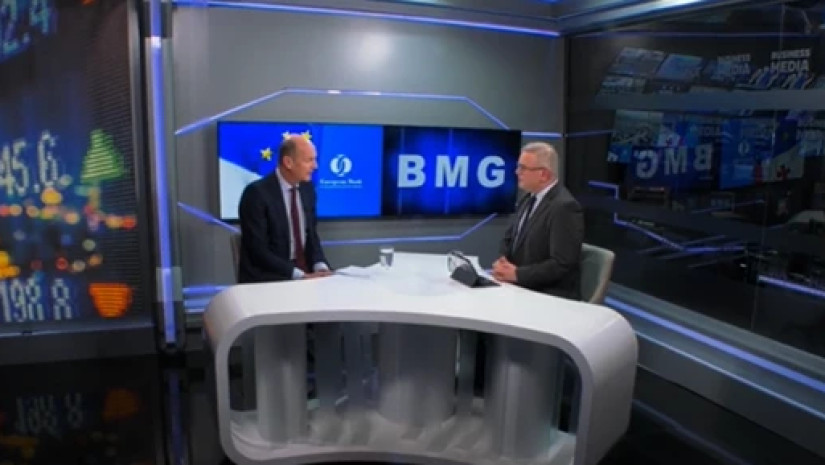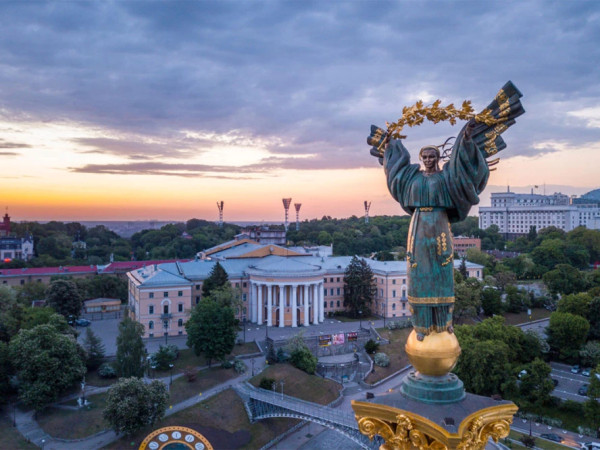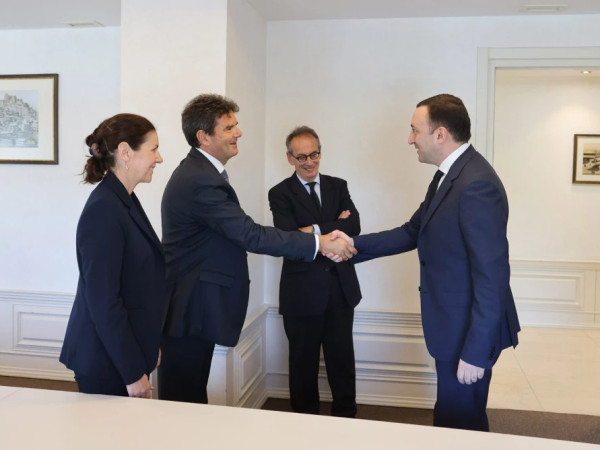European Bank for Reconstruction and Development (EBRD) Vice President for Policy and Partnerships Mark Bowman and Managing Director for Eastern Europe and the Caucasus Matteo Patrone visited the Caucasus from 16 to 19 January, first visiting Armenia, then Georgia, before concluding their trip in Azerbaijan.
Within the frame of his tour, Giorgi Isakadze, Editor in Chief of Forbes Georgia/BMG interviewed Mark Bowman.
Mr. Vice President, thank you so much for your time, for being with us, and for visiting us. Thank you that you found time in your schedule that you have in Georgia.
Well, thank you very much for inviting me to your program. It is a pleasure to be here.
Mr. Bowman, when we hosted Madam President, Renaud-Basso here in our office, the first question was like the one I will ask you, as it was about the purpose of the visit. We know about the high-level meetings with governmental officials and the private sector. Could you be more specific about the purpose of your visit?
The purpose of my visit to Georgia is to meet with the Government, to understand the current economic situation and the challenges that the Government is facing, and to discuss how we can continue and deepen our cooperation.
As a part of your visit, you are covering Azerbaijan, Armenia, and Georgia.
This week we are visiting three countries in the region. It is a real opportunity to visit all three countries, which have been the long-standing partners of the Bank. We are visiting them with the same purpose: to understand the current situation and economic challenges and to see how we can continue to deepen our cooperation.
Apart from the official meetings, which we are already aware of, you have held a meeting about the one the modernization of Tbilisi Metro, for which €50.6-million-loan has been granted. Could you specify other details from your meetings with the governmental officials? Then, I will move to the private sector, where you have many partners.
Let me say a word about the Tbilisi Metro modernization project signed today. We are pleased to sign that project – a 50-million loan to help with the repairing and rehabilitation of twelve metro stations in Tbilisi. As I am sure you know, Tbilisi was the first city to join our flagship Green Cities program, through which we work with city authorities to help them to develop comprehensive plans for the environmental management of the cities. It has been a great success in Tbilisi; we have had eight projects under the program. We had a few projects in the transport sector. As residents of Tbilisi will know, there is an imperative to shift people from private transport to public transport and to develop the metro system so that it could provide a more efficient and better service - these are our objectives, which will bring benefits in terms of reducing pollution and improving the quality of life.
During our conversation with the President of EBRD, Madam President talked about Tbilisi as a role model for a green city.
Exactly. Tbilisi was the first city to join this flagship program of the EBRD, and it has been extremely successful. Around 8 to 10 projects we have implemented in the transport sector, and the experience we have had working in Tbilisi has been extremely helpful to roll out the project in other countries of operation.
Mr. Bowman, did you get the feedback and statistics from your Georgian counterparts, mainly Governmental officials, necessary to understand better how the Georgian economy is moving forward?
To return to your earlier question, one of the things today was signing this project. More generally, however, meetings with the Government were productive and discussions were intense, understanding the current economic situation and developments in the country. The economic and macroeconomic situation is more positive than people might have expected a year or so ago, but we live in a world of great uncertainty, and it is important to take advantage of the current situation to progress vital reforms to be prepared for the future. Our conversation with the Government was both about understanding the current economic situation, but also discussing progress with their reform priorities and specific projects where we can continue our collaboration.
I would like to recall the portion of my interview with Madame Renaud-Basso about the Investors Council operating in Georgia, which according to Madam President, is also a role model. Madam President told me that it might be the best Investors Council. Could you tell me more about your meetings with the private sector? How did they go?
The Investors Council here in Georgia is very successful. We think that it is very useful for the private sector to share its views with the Government. We have been involved with the Investors Council for several years since its creation in 2015. It is extremely useful for businesses and the private sector to put forward their ideas and their suggestions about how the regulatory framework and the legislation could be changed. It has been a successful model in terms of delivering concrete reforms which have led to the tangible investment. As you hinted, it’s a model that we rolled out in other countries, but we have been particularly pleased with the progress made with the Investors Council here in Georgia.
I would you love to share information about the ongoing projects, plans, and the focus that our strategic partner, EBRD, might have this year and in the following years. Could you be more specific about the EBRD projects in Georgia?
Absolutely. The EBRD has been a long-standing partner of Georgia. We’ve been active in this country for thirty years and cumulatively, over this time, we have invested €5 billion in about 300 projects. Our focus has been primarily on the private sector, 80% of our investments have been in the private sector. We support small- and medium-sized enterprises by working with partner financial institutions and local banks by giving them credit lines that they can lend to SMEs. We’ve worked with the public sector and with cities, as we just discussed. We’ve been active in infrastructure investments, too – in roads, for instance, a project that we completed recently with the Georgian Railway in terms of digitalization of the company. Thus there is a combination of primarily focusing on the private sector but also working with the Government. One of the unique things about the EBRD is our ability to combine investment with policy advice and technical assistance, so playing our part by contributing to the modernization of the Georgian economy.
While mentioning infrastructure projects and some ongoing or future involvement of EBRD in Georgia, we must talk about the prospects of the Middle Corridor, which has become more realistic after the disaster that began approximately a year ago – I am referring to the war in Ukraine, of course. What is the role of Georgia and the Bank in the development of this transitional transport route? We are constantly discussing possibilities, but there are conversations that Georgia must prepare more aggressively and be an active country while coordinating the Middle Corridor.
It is a very interesting question and an interesting issue. Let me first say a word about Ukraine. The EBRD was very clear in its condemnation of Russian aggression. We have been active over the last year, supporting and investing in Ukraine and continuing to support the economy.
Coming back to your question about the Russian aggression, it has had significant consequences for many other countries in terms of international trade and international connections – there is always a clear advantage for countries to develop new trade links, corridors, and trade routes. Particularly so because of the Russian aggression in Ukraine. Georgia, with its geographic position, has enormous potential to play a role in the Middle Corridor by connecting Central Asia to Europe. The requirement is to develop infrastructure, such as road infrastructure, railway infrastructure, and ports. These are all ideas in which we are willing to engage, to discuss potential options with the Government, and to look in detail at the potential for further collaboration.
Given that you just mentioned the ongoing war in Ukraine, how has the war affected projections of economic growth? Let us discuss the Caucasus region as you are set to visit three countries, namely Georgia, Armenia, and Azerbaijan.
It is a very interesting question. Russian aggression in Ukraine has had significant implications for the region in different dimensions. In some sense, economies in the region are, perhaps, doing better than might have been expected because of the inflows and money that have come from Russian citizens leaving the country and establishing businesses in Georgia. One of the issues, if we think more broadly, has been the need for countries to reduce their reliance on Russia and Russian energy due to the concerns around the insecurity of supply.
It brings us to a parallel topic, which I’ve been very keen to explore with the Government today is for Georgia to significantly develop its renewable energy potential. Hydroelectricity is already quite developed in Georgia.
Do you mean that it was one of the main topics discussed?
It’s one of the very important topics, as helping countries with the energy transition is a priority for the Bank. Given the war in Ukraine, the case for countries to accelerate the transition into renewable energy is even stronger than before. Obviously, due to the climate, but also the economic and energy security cases, it makes sense for a country to develop renewables to produce cleaner, cheaper, and more secure energy.
Given the key priorities you just mentioned, can we consider that EBRD might consider potential involvement in the Black Sea Submarine Cable project? I’m more than sure that you are aware of this project.
I am very much aware of this project. I have been discussing it with various partners and the Government. It is a project for which we would like to look at the details but would consider involvement. It is a very ambitious and technically complex project, so work must be done in terms of feasibility and technicalities. Yet, the principle of Georgia thinking about how it can expand its domestic electricity production and become a net exporter of electricity is a principle that we very much support and would be very keen to investigate.
Thank you so much for your time and for being with us. Your insights were interesting, so thank you, Mr. Vice President.
Thank you for having me.















